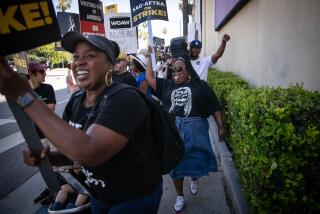L.A. choreographer Instagrammed solidarity with protesters. Then came a backlash
- Share via
A black dancer holds a strenuous, acrobatic pose using the body of a smiling and armed white police officer for balance. That’s the photo L.A. choreographer Jacob Jonas posted to his company’s 148,000 Instagram followers earlier this week, with a caption that began, “It’s not white vs black. It’s everyone against racists.”
The caption of Sunday’s post continued: “I woke up this morning to an article showing the many police officers with great ethics and values protesting with the people against police brutality. Police brutality is not acceptable.”
On that day, Jonas’ post was one of many in a sea of messages promising solidarity with black people, decrying police brutality and expressing support for the Black Lives Matter movement as protests, sparked by the death of George Floyd, continued across the nation. But the image and caption, which some felt minimized the enduring police brutality experienced by black people, quickly caused a ripple of backlash in pockets of the dance community.
It’s a situation playing out online in real time among other artists and arts organizations as social media shows of solidarity are being met with demands for accountability for past actions.
Responses to a recent American Ballet Theatre post about solidarity was a mix of heart and clapping emojis along with calls for the dance company to diversify its ranks. When the Solomon R. Guggenheim Museum in New York tweeted about solidarity with protesters, Chaédria LaBouvier, who last year became the museum’s first black curator to organize a solo exhibition, tweeted back a fiery rebuttal.
L.A. choreographer Chris Emile responded to Jonas’ post with one of his own on Instagram, saying Jonas was “using his huge following to promote a tone deaf agenda to silence people’s outrage of white supremacy.”
“To use this image of a black man essentially being supported by this white police officer (with his hand on his gun mind you) is just another example of his privilege and ignorance,” Emile continued on Instagram.
Emile, whose recent work explored black masculinity, had previously spoken out on social media against white choreographers who profit from using black dance forms without giving proper credit.
“Of course not all white people are racist,” Emile wrote in his response to Jonas. “But nevertheless white supremacy is global and has enabled people like him [Jonas] to profit off of black bodies and art for centuries while simultaneously discrediting their struggle.”
Emile’s post also included an account from Invertigo Dance Theatre executive director David Mack — who is black and spent the past seven years as an L.A. dance consultant and producer — about a previous interaction with Jonas.
About five years ago, Mack wrote in the message to Emile that Jonas “called me a racist because of my values of diversity, told me that I was a con-man and a liar for saying that I had to work twice as hard as my white counterparts in school to get half the opportunities.”
Jonas, Mack wrote, “threatened to get me fired from every job I had in the arts, and said I didn’t belong in the L.A. dance community because I take money that should go to artists while my secret mission is to ‘diversify’ dance companies instead of improving them.”
The incident took place in 2015 when Mack was a consultant for Diavolo Architecture in Motion and was interviewing Jonas to be the director of the dance company’s project centered on veterans’ issues. Mack was a donor to Jacob Jonas the Company, “so during my encounter with him, I was speaking to him as a donor and a prospective employer,” Mack explained by email in a recent Times interview.
“I asked him where he’d like to meet, and he chose a public place,” Mack said. “Because he chose to make his remarks to me publicly, I gave [Emile] permission to share my message to him on his social media post.”
Jonas, who deleted his original post, declined an interview with The Times, pointing to his statement posted to Instagram the next day.
“I created a post yesterday to try and illustrate unity,” Jonas, 28, wrote. “It represented an ideal, but it didn’t take into consideration the amount of anguish and rage the black community feels against the police for the unjustly murders of their sons and daughters. It was ill-timed and insensitive. I am deeply sorry.”
“My team and I are standing together with the black community,” the statement continued. “I am deeply sorry again for the post. I have received backlash and understand I will continue to.”
Mike Tyus, a company member and the dancer in the deleted photo with a police officer, defended Jonas online, saying the dance troupe is “a company that I am so proud to be apart of. A company I consider my own.”
For Mack, in light of current events, the 2015 encounter “seems vapid by comparison.”
Mack said he recently reached out to Jonas “to have a private conversation with him to use this as an opportunity for him to learn and grow into the best version of himself as a nonprofit arts leader, and I’m waiting to hear back on next steps.”
Mack also said by phone that he felt supported and hopeful for the future of the L.A. dance community.
Although it may seem awkward and performative, making an authentic statement, Mack believes, is the first step toward taking action, such as becoming a true ally to black people or changing company culture.
“This is a really great opportunity to not be afraid of being perfect because people are messing up all over the place,” Mack said.
Now is the time for arts organizations to voice how they are feeling in this moment, their intentions and values.
“Once you do that, then I think we can even start to talk about action steps,” Mack said. “I really don’t think we’re there yet. As the L.A. dance community, there’s a lot more work and steps to do.”
More to Read
The biggest entertainment stories
Get our big stories about Hollywood, film, television, music, arts, culture and more right in your inbox as soon as they publish.
You may occasionally receive promotional content from the Los Angeles Times.











